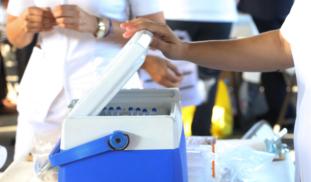Peer effects and sharing behaviour
When individuals interact in social settings and observe decisions by their peers, they are motivated to maintain a positive self-image and converge to a consensus. This is true also in the context of sharing behaviour and charitable giving. In our updated design, we take potential peer effects into account. Under an altruistic narrative, we might expect subjects to share more if they fall behind their peers' sharing behaviour because of perceived social pressure. Similar effects have been demonstrated in the literature in the presence of social pressure, or conditional cooperation (DellaVigna et al., 2012 and Wiepking and Heijnen, 2011) and in the presence of social comparison (Partika, 2017). Under a self-interested narrative, we might expect similar behaviour for a different reason: a greater group confidence in the benefits of sharing suggest that an individual should align their beliefs and sharing decision with that of the group. More details are in our updated pre-analysis plan.






1 comments